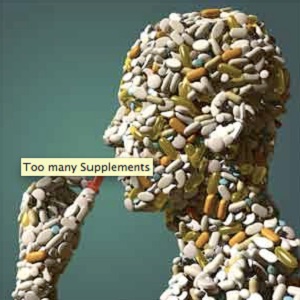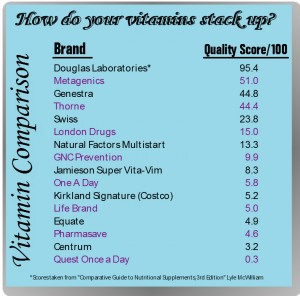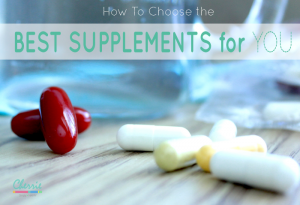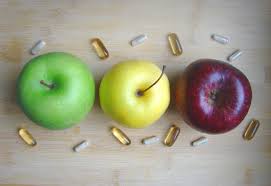Is your supplement or supplements working for you?
By Dr. Barbara Rodwin, Doctor of Chiropractic, Cranial Adjustor and Active Release Technique Provider
If you have questions, Email me at: Dr.Rodwin@Back2Health4you.com
What is in a supplement? Do you need to take supplements? If so, which ones are best for you? How do you know if the supplement overs the correct amounts of daily requirements?
The rules and regulation here in Canada are lacking with proper regulation of many parts of our supplements, foods, toiletries, etc. . . . Although, there is a database for licensed natural health products that many consumers are unaware of. Even if a natural health product is approved by Health Canada, the quality of the supplement can still be lacking. Due to this problem, I personally stick with products that can only be distributed by licensed health practitioners (such as naturopathic doctors, chiropractic doctors, and medical doctors). A major question then becomes, how do I know if my supplement is of good quality? There is a book for health professionals by the name Comparative Guide to Nutritional Supplements by Lyle MacWilliam. With its 5th edition recently released, the author Lyle MacWilliam, MSc, FP, has been a scientific consultant and public advocate for the supplement industry. His past position as a consultant for Health Canada was to develop a regulatory framework for the manufacture and sale of nutritional supplements in the Canadian marketplace.
I currently use this guide (seen on the right below) as a reference for the types of supplements that we should be carrying. Our clinic carries supplements developed by Douglas Laboratories, Metagenics, Pure Encapsulations, and Thorne. These supplements all rate at least a 4 or higher out of 5 on the ratings scale developed in MacWilliam’s book. In contrast, supplements from Centrum, Jamieson and Kirkland Signature rate a 2.5 or lower on the same scale. Please see the picture below to check where your supplements are listed on this scale! To evaluate the supplements, the book uses 18 categories to factor into the scale. Without the necessary regulations it’s up to you, the consumer, to filter out the bad supplements from the good.


What to look for when purchasing a supplement!
By Dr. Barbara Rodwin, Doctor of Chiropractic, Cranial Adjustor, Acupuncturist, and Active Release Technique Provider
If you have questions, Email me at: Dr.Rodwin@Back2Health4you.com
Please have a look at the newsletter bulletin board in front reception for the charts of what not to have in your supplements, the information on the counter out front, the board in room 7 and the overheads in the treatment rooms!
Nutrient Form: Read the labels carefully to see what nutrient forms are included. These are listed in parentheses after the name of the nutrient.
Synthetic or natural forms: For some nutrients, there’s no special form to look for. Any kind of Vitamin C, for example, synthetic or natural, is acceptable. Vitamin E and beta-carotene, however, are another story. For these two ingredients, the natural forms are definitely superior.
Bioavailability: Many forms of B-vitamins, D-, C-, E- and minerals have both a not available form: harder to digest and not as absorbable. Ensure your supplements have the most bioavailable forms possible! That way you take the most in and have the greatest benefit. Also ensure that the supplements do not have a lot of binders and fillers that then cause you not to absorb as much! Have Dr. Barbara Rodwin check your supplement for the amounts of items!
Minerals: Minerals also come in various forms. Elemental minerals, such as those found in soil, are not readily absorbed, so manufacturers bind them to amino acids or other substances that our bodies are able to take in. These are known as “chelated” minerals, and have names like magnesium succinate, calcium citrate, etc.
Generally speaking, most forms of minerals are acceptable, but there are some differences in bioavailability based on your health status. The most common form of calcium—calcium carbonate—for example, isn’t well absorbed by people who are deficient in hydrochloric acid.
Because of individual differences in the ability to absorb a nutrient, mineral supplements that contain a variety of sources are probably the best supplements to take. In the case of calcium, sources such as carbonate, citrate, ascorbate, aspartate, malate and with Magnesium look for magnesium GLYCINATE.
Dosage Level: Once you’ve confirmed that a product has the right forms of the nutrients you’re looking for, the next step is to make sure the product has enough of those nutrients to actually improve your health.
Some products boast a wide range of really good ingredients. Yet when you look at their labels, the amount of each ingredient is so small that it couldn’t possibly have a therapeutic effect. For example, an arthritis supplement may promote itself as having a whole slew of great ingredients, including 500 mg of glucosamine sulfate. To the unknowing eye, that probably sounds great. However, clinical trials have shown that the amount of glucosamine sulfate needed to produce a beneficial effect is actually three times that amount—1,500 mg. So while you may believe you’re getting a great product, in reality, it’s not going to do you much good.
Know the recommended dosages for key nutrients before you go shopping so that you can better identify the best supplements to take.
Have a look at the sheets we prepared on some supplements and what their down falls are!
Reputable Manufacturers: Nutritional supplements are big business, and thousands of companies are in the market. Solid, reputable nutritional supplement manufacturers formulate supplements based on scientific research, buy the best raw materials and pay independent labs to make sure their products meet label claims and contain no contaminants.
It is perfectly reasonable to contact a supplement manufacturer and ask for verification of quality. Good companies have product specifications, research supporting their formulas and laboratory assays stating that their ingredients are free of contaminants and true to dosage claims made on the labels. Some of this information is available on company websites. If you’re unable to go this route, however, feel free to call and ask about quality-control measures. This will require some effort, but it will be well worth your time to ensure they are actually the best supplements to take.
Price: We’re all looking to save money, but understand that price has some bearing on quality.
Do not purchase dirt-cheap or mail-order brands without carefully studying labels and learning something about the company. Manufacturers of discount products have to save money somewhere, and they may do it by using inadequate dosages, improper nutrient forms or other cost-cutting measures.
You can get information like this from organizations that evaluate consumer products. One that specializes in nutritional supplements is Consumerlab.com. They review a wide variety of nutritional categories, make general recommendations, test products for quality and potency; and post all of this information on their website.
Expiration Dates: Always look for an expiration date. While some nutrients, such as calcium and other minerals, maintain their potency for several years, others like vitamins B and C have a significantly shorter shelf life.
Label Red Flags: Look for “red flags” on labels—sugar, artificial coloring and flavoring, preservatives, and additives such as shellac, chlorine and other chemicals should be avoided.
Have a look at the list of items that we have listed in front reception and in the newsletter from 2014: found here. Also have a look at the supplements we carry on our website.


Excipients in Vitamin Supplements
Excipients are substances other than the pharmacologically active ingredients which are included in the manufacturing process or are contained in a finished product. In many products, excipients make up the bulk of the total dosage form.”
Additives in supplements cause allergic reactions impede absorption of the active form of the supplement (they can decrease absorption by over 65 %!), cause cell death, have undesirable physiological effects and can cause many other health issues. In many cases, an ingredient carries a negative connotation, so the manufacturer uses instead, a euphemistically derived alternative (such as “glaze” or “natural vegetable coating” for shellac).
Principal Excipient Functions
| Binders Disintegrants Fillers Lubricants Flow Enhancers Compression Aids Colors |
Sweeteners Preservatives Suspending/dispensing agents Film formers Coatings and Glaze (Shellac) Flavors Printing Inks |
Most Commonly Used Excipients
Try to avoid these additives when buying supplements!
| Magnesium Stearate Stearic Acid Sodium Benzoate Potassium Sorbate Flavors or Natural Flavors Silicon Dioxide Titanium Dioxide Colors Lactose Cellulose Gelatin |
Sodium Glycolate Talc Sucrose Calcium Stearate Palmitate Hydroxy Propyl Methylcellulose Ethyl cellulose Glaze Shellac Starch |
Be careful with the supplements you take!
Read the labels and research how toxic they may actually be. Also, be sure and check the source of the ingredients.



